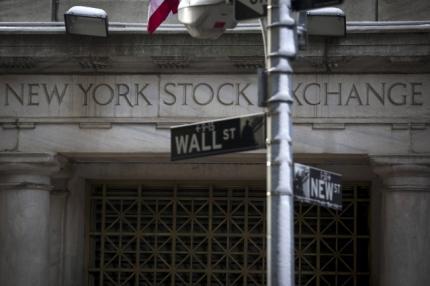Wall St bounces back as bargain hunters move in
Bareksa • 05 Feb 2014

The Wall St. sign is seen outside the door to the New York Stock Exchange in New York's financial district (REUTERS/Brendan McDermid)
J.C. Penney shares slide after bearish comments
Reuters - U.S. stocks rebounded on Tuesday, buoyed by encouraging earnings, as the market attempted to steady in the wake of its largest selloff in months a day earlier.
The Standard & Poor's 500 fell nearly 3 percent over the previous two sessions, including Monday's slide, which was the worst drop for the benchmark index since June. The selloffs were triggered by weaker-than-expected U.S. data, as well as concerns over growth in China and the outlook for some emerging economies.
The drop proved enticing for investors looking for bargains as emerging market concerns retreated and their currencies moved off recent lows. The S&P's consumer discretionary and financial stocks were among the best-performing sector indexes.
Investors have focused on macroeconomic data in the wake of a rout in emerging market currencies, which triggered rate hikes by some central banks. That pressured stocks and bonds and forced investors to favor assets perceived as relatively safe, like the yen, U.S. Treasuries and German government debt.
"Everything that was sort of getting beaten up is bouncing. It will be interesting to see what happens if the currencies trade back down and what our market thinks of that," said Stephen Massocca, managing director at Wedbush Equity Management LLC in San Francisco.
"There might be some more wood to chop here, I'm not one hundred percent sold on this."
The price of protection against further declines in the S&P 500 slid 10.9 percent after jumping on Monday to its highest level in 13 months. The CBOE Volatility Index, known as Wall Street's fear barometer, closed on Tuesday at 19.11.
Data on Tuesday showed new orders for U.S. factory goods fell in December, but rose for a third straight month when the volatile transportation sector was excluded.
The Dow Jones industrial average rose 72.44 points or 0.47 percent, to end at 15,445.24. The S&P 500 gained 13.31 points or 0.76 percent, to finish at 1,755.20. The Nasdaq Composite added 34.562 points or 0.86 percent, to close at 4,031.52.
Of the 277 companies in the S&P 500 that have reported earnings so far this season, 69.3 percent have beaten analysts' profit expectations, while 65.2 percent have exceeded revenue expectations, according to the latest data from Thomson Reuters.
Pfizer was among the S&P 500's leaders with a 2.8 percent gain to $31.44 after Jefferies upgraded the largest U.S. drugmaker's stock to a "buy" from a "hold" rating.
Michael Kors Holdings Ltd reported a 77 percent jump in third-quarter profit as shoppers snapped up its handbags and accessories, pushing the company's shares up 17.3 percent to $89.91.
Bank shares were underpinned by U.S-traded shares of UBS and Itaú Unibanco, which rallied. Itaú, Brazil's largest private-sector lender, reported record fourth-quarter profit that beat analysts' estimates. UBS swung to a larger-than-expected fourth-quarter profit and announced higher dividends and bonuses.
Itaú ADRs shot up 7.6 percent to $12.96. UBS added 5.9 percent to $20.36.
J.C. Penney Co Inc shares dropped 10.6 percent to $5.08, reversing a steep gain in pre-market trading. The U.S. department store chain reported a modest rise in quarterly comparable sales, but gave no details on its gross profit margin, leading analysts to conclude it had to resort to bigger discounts during the holiday season. JPMorgan and Sterne Agee cut the target price of the stock - JPMorgan to $5 from $6 and Sterne Agee to $3 from $9.
Shares of Yum Brands Inc rose 8.9 percent to $72.06 after the KFC parent reaffirmed its 2014 profit outlook and said a resurgent bird flu in China had not hurt national sales in its top market.
Furiex Pharmaceuticals shares more than doubled in price. The drugmaker said an experimental drug met the main goal of a pair of large clinical trials by significantly alleviating diarrhea and abdominal pain associated with irritable bowel syndrome. Shares soared 129.9 percent to end at $105.69.
Volume was active, with about 7.41 billion shares traded on U.S. exchanges, above the 6.94 billion average in January, according to data from BATS Global Markets.
Advancing stocks outnumbered declining ones on the NYSE by a ratio of 2 to 1. On the Nasdaq, nearly two stocks rose for every one that fell.